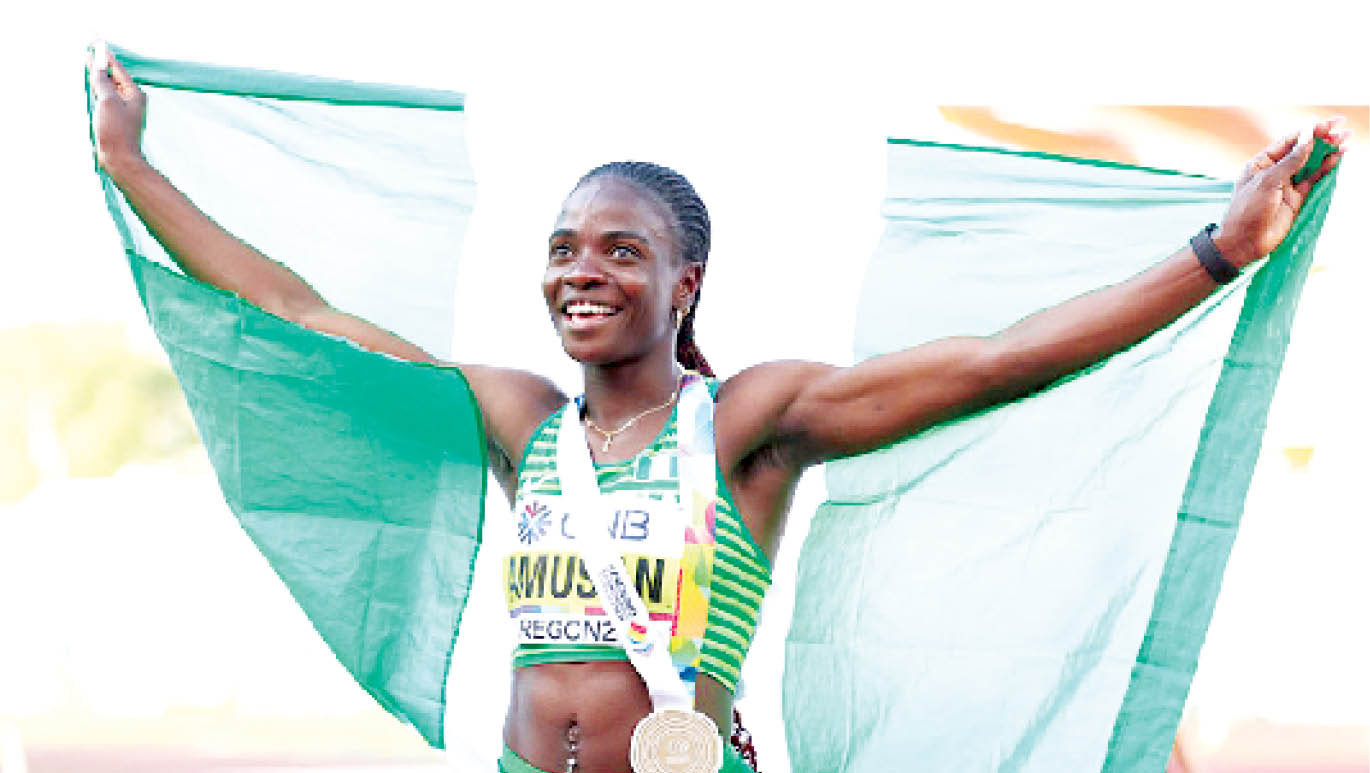We must honour Tobi Amusan
Nigerians are still celebrating the outstanding sporting victories of our athletes who participated in the 18th Edition of the World Athletics, which ended the penultimate week in the US. Of particular interest was that of 25-year-old Nigeria born super athlete, Oluwatobiloba Ayomide Amusan, popularly known as Tobi, who not only won two gold medals but […]

World champion, Tobi Amusan celebrates her historic feat
Nigerians are still celebrating the outstanding sporting victories of our athletes who participated in the 18th Edition of the World Athletics, which ended the penultimate week in the US. Of particular interest was that of 25-year-old Nigeria born super athlete, Oluwatobiloba Ayomide Amusan, popularly known as Tobi, who not only won two gold medals but also set a new world record in the Women’s 100 metres hurdles event. She had first, set a new world record with a run of 12.12 seconds in the semi-final, and followed it up with a blistering 12.06 seconds run in the finals to take the gold and have the Nigerian national anthem played at the arena. With these feats, Tobi became Nigeria’s first ever world record holder in any event.
Alongside Tobi, 26-year-old Ese Brume won a silver medal in the long jump event. These victories – coming at this time in the country’s history, provide a refreshing turn of events against the ambience of gloom that had gripped the country lately, and contrasts sharply with poor returns in performance shown by the Super Eagles, Nigeria’s most well-known sporting brand, in recent years. The prospects of the world seeing some good coming out of Nigeria is cause for joy and pride in all Nigerians.
The import of Tobi’s new world record cannot be lost on both the country and the sporting world. Unlike some countries at comparable levels of social development as Nigeria, like Kenya and Jamaica, both of which had produced several world record holders in various events, this is Nigeria’s first ever world record. Amusan’s world record is a reward for her tireless efforts, but also for her country and countrymen and women, and a timely reminder of the relationship between citizen and country.
For Amusan, her victories and records represent a dream come true. As many have noted since her victory, Amusan wrote six years ago on Twitter that she was “Unknown now, but I will become unforgettable… I will persist until I succeed”. She has indeed achieved the unforgettable, and the singing of Nigeria’s national anthem at that event will be remembered forever as the hallmark of the success she brought to her country. But it goes well beyond herself. Her victories at the global event also represent a positive and powerful example for all Nigerians, particularly the youth, that hard work pays in the end.
In a country brimming with cyber-fraudsters, rituals for money cliques and kidnapping for ransom gangs, most of them young people, Amusan’s positive example of hard work must precede success cannot be emphasised enough. But for all Nigerians, her world record, earned through uncommon personal sacrifice, is a worthy reminder of that timeless homily by US President John F. Kennedy during his inaugural address to his country on January 20th, 1961 “Ask not what your country can do for you, ask what you can do for your country”.
However, even though we celebrate Tobi Amusan and Ese Brume, we must not be blinded to the demanding personal circumstances under which their feats were attained. Amusan and Ese won under the usual failings of sports administration in Nigeria – a syndrome that had in several instances cost the country severely through lost opportunities for sporting laurels. Other athletes that have earned laurels also have their tales of frustration that should have turned their stories otherwise. Nigeria has lost too much pool of talent in various sports and games to the corrupt shortsightedness and incompetence of its sports administration.
Nigerian athletes in almost every sport now represent other countries in global sporting events, principally because our sports administrators, and governments more broadly, have been unable or unwilling to build a sporting system capable of harnessing and rewarding the talented Nigerians wherever they may be in the world. But this can no longer continue. Amusan’s world record offers Nigeria and the Ministry of Sports an opportunity to turn things around in this regard.
The first place to begin is for the federal government to compensate Amusan and her family for all the expenses incurred for her training and attendance at sporting events throughout her professional career to date. Nigeria owes Amusan this small gesture of appreciation and considering the billions of naira budgeted and spent annually on sports, Amusan’s compensation should not amount to much. More than that, however, the federal government must confer due honours on the athlete, not just for her laurels and records, but also for the positive cheers she brought to the country on a global stage at such trying times as we are in now.
It is time the federal and state governments realised the potential of sports in Nigeria. More than the national flag or the anthem, sports is Nigeria’s most effective symbol of unity. And it is this unifying role of sport in the country that triggers the expectations of Nigerians for sustainable, excellent performance by our countrymen and women in global sporting events. Nigeria must meet these expectations.
